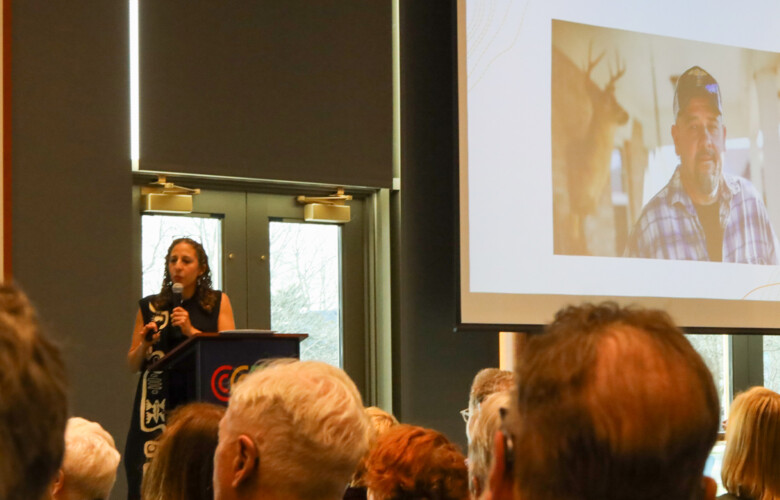Farah Stockman on her book, American Made
March 20, 2025Recently, we partnered with the Carmel Clay Public Library to bring Pulitzer Prize-winning journalist Farah Stockman for a talk on her 2021 book, American Made: What Happens to People When Work Disappears. We’re grateful to the author, Carmel city councilor Jeff Worrell, Aaron and Katy Renn, and the library for making the night possible.
Recently, we partnered with the Carmel Clay Public Library to bring Pulitzer Prize-winning journalist Farah Stockman for a talk on her 2021 book, American Made: What Happens to People When Work Disappears. We’re grateful to the author, Carmel city councilor Jeff Worrell, Aaron and Katy Renn, and the library for making the night possible.
During the conversation, Stockman shared some of her experiences gathering information about the closing of Indianapolis’s Rexnord manufacturing plant. Before she got to know Indianapolis factory worker Shannon Mulcahy, she saw the world mostly from the perspective of people like herself: college-educated, well-traveled, and accustomed to abundant opportunities to experience the world around them. But when Stockman’s New York Times editors sent her to Indianapolis to interview factory workers who would lose their livelihoods as jobs were sent to Mexico and Texas, Shannon, along with other subjects from her book, John and Wally, introduced Stockman to lives much different from her own.
As we like to do at Indiana Humanities, we’ve recapped the conversation. Here are some moments that stood out to us:
Jobs are identities, especially for families with multiple generations working in the factory plant, which provided a second family, a bowling team, healthcare benefits, and more. When plants close, workers not only lose their jobs but their identities. A U.K. study conducted during the COVID-19 pandemic found that the mental health of people whose work hours were cut fared better than those who lost their jobs. Stockman reported that the researcher told her even one day a week of paid work improves mental health.
Winners and losers. Working at Rexnord was a status symbol. It came with benefits like good pay and a 401(k). When workers complained about the plant closing, they didn’t get a lot of sympathy from those who earned less working elsewhere. They’d already been the winners, having reaped the benefits of higher pay and better benefits. Now it was their turn to feel the pain.
The unintended consequences of globalization. Stockman said that globalization and free trade had been “awesome” for people like her, who shared stories and news from around the world. “Almost every job I’ve had has a global component. But for people like Shannon, it was devastating,” as factory work started being outsourced to other countries.
Empathy breeds understanding. It’s tough to have empathy for people you don’t know and whose lived experiences are different from your reality. In reporting for her book, Stockman dove into the lives of Shannon, John, and Wally to learn about things like the repercussions of a decision to send their jobs elsewhere, the politics of crossing picket lines, and the importance of side hustles for some Black factory workers who never expected a job for life because they were used to losing out.
Who’s losing jobs now? In the last few months, 25,000 federal workers, 20,000 tech workers, and thousands of others in grant-funded positions have been put out of work. In other words, the tables seem to be turning, with the more educated workers in government and academia losing jobs en masse. Stockman noted that some she has spoken to in the working class were unaware of the recent job cuts. To Stockman, this suggests that, while the focus of job cuts is changing, there is still a lack of knowledge about who is facing job losses, leading to a lack of empathy between different groups of Americans who do different types of work in our country.
You can view photos from the event here.



